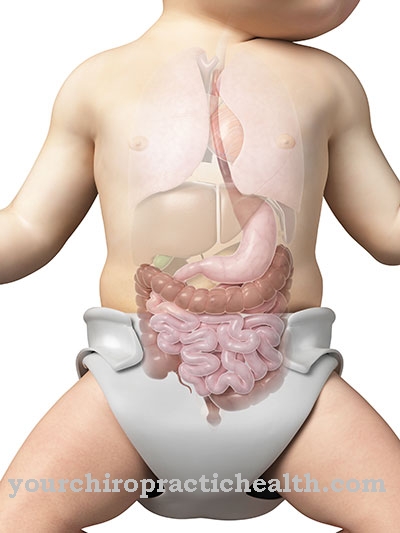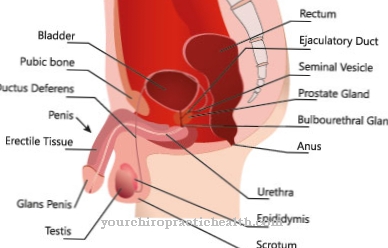The Graft-versus-Host Response is an immunological complication that can lead to rejection of the graft in allogeneic transplants. The reaction can now be controlled by the prophylactic administration of immunosuppressants. Even so, the mortality rate is still ten percent today.
What is the graft versus host reaction?

© 7activestudio - stock.adobe.com
In a transplant, organic material is transplanted from a donor into a recipient. If the donor and recipient are not twins, it is referred to as an allogeneic transplant. The recipient's tissue is not genetically identical to the donor's tissue. Repulsions can therefore occur.In such cases, there is often a graft-versus-host reaction. In fact, this reaction is one of the most common transplant complications.
It is a cytotoxic immunological reaction that the implanted or transfused immune cells in the transplant undertake against the recipient's organism. The T lymphocytes in particular react against the transplant recipient. The literal translation of the graft-versus-host reaction is graft-versus-host reaction. It plays a role primarily in bone marrow transplants and stem cell therapies, but is also observed in other transplants. There are four degrees of severity of the reaction.
causes
The cause of a graft-versus-host reaction is the transplantation of foreign immune cells. Immunological cells are specialized cells from the bone marrow, from the spleen or from the lymph nodes. Such cells can be contained in transplants, for example, and trigger cellular immune reactions in the organism of the transplant recipient.
As part of the reaction, specific, cytotoxic T cells are formed that are directed against the host. The risk of a complication such as the graft-versus-host reaction depends on the immunological compatibility of the recipient and donor organism. The human leukocyte antigen determines this compatibility and should be the same as possible. Even when sibling donors with the same HLA are transplanted, graft-versus-host reactions of mild to moderate severity develop in over a third of cases.
The stability of the recipient organism also has an influence on the reaction risk. Immune-healthy recipients usually break down the transferred immune cells without complications. Immunocompromised hosts are unable to do this.
Symptoms, ailments & signs
The symptoms of the graft-versus-host reaction depend on the severity. Serious illnesses such as atrophy of the lymphatic organs, disorders of the gastrointestinal tract and skin changes or cachexia are conceivable in immunocompromised persons. The graft-versus-host reaction can thus even be fatal. An acute graft-versus-host reaction is a reaction in the first few weeks after a transplant.
The epithelial cells of the skin are affected by maculopapular rashes or erythroderma. Enteritis often develops in the intestine, with consequences such as diarrhea or painful stool tenesmus. The liver reacts at the same time with jaundice, which can lead to liver failure. The chronic graft-versus-host reaction only sets in after about three months.
Severe infections and changes in the mucous membrane in the gastrointestinal tract are their main symptoms. The serous membranes of the skin and liver can also be affected. In all forms, the reaction is expressed primarily in symptoms of the skin, liver, intestines, or eyes.
Diagnosis & course
The acute form of the graft-versus-host reaction manifests itself histologically as lymphocytic infiltration. Cell damage and cell death are also present. The histological evidence of these circumstances has diagnostic value after a transplant.
Since the symptoms are relatively typical and are directly related to a transplant, diagnosis is relatively simple. The course depends on the severity of the reaction.
Although the current state of the art in medicine has pathways that significantly reduce the risks of a graft-versus-host reaction, the immunological rejection mortality rate for allogeneic transplants is still about ten percent.
Complications
The graft-versus-host reaction can lead to various complications and complaints. However, the further course depends on the severity and severity of the disease. In most cases, however, there are discomforts in the stomach and intestines. The skin can also be affected by changes.
If the graft-versus-host reaction is not treated properly or not treated early, the patient can also die. The discomfort in the bowel is usually caused by an inflammation of the bowel. This is associated with severe pain and diarrhea. It can also lead to complete liver failure, resulting in death.
Treatment only takes place if the graft-versus-host reaction is a life-threatening condition for the patient. Medication is mainly used and there are no further complications. The treatment is closely monitored so that there are no infections and inflammations.
In severe cases, radiation can also be carried out. Typically, the graft-versus-host reaction will not reduce life expectancy if treated properly. However, life expectancy may have been reduced as a result of the previous cancer.
When should you go to the doctor?
In most cases, the graft-versus-host reaction is diagnosed in the hospital and can therefore be treated relatively quickly. For this reason, an additional diagnosis is no longer necessary. Treatment by a doctor is necessary if there are symptoms in the stomach or intestines after a transplant.
Those affected suffer from pain when defecating or generally from stomach pain. Diarrhea is often an indication of the graft-versus-host reaction and should be examined especially after a transplant.
The symptoms can also occur a few weeks after the procedure. If the symptoms are noticed, the doctor treating the transplant or a hospital must be consulted immediately. The treatment is then usually inpatient in order to avoid liver failure and thus the death of the person concerned.
In general, it cannot be predicted whether the outcome will be positive. However, early diagnosis and treatment have a positive effect on the course of the disease.
Doctors & therapists in your area
Treatment & Therapy
Basically, a weak graft-versus-host reaction is not necessarily life-threatening, but can even benefit the recipient in the case of cancer and kill the remaining cancer cells. Nevertheless, the reaction must not take place untreated or in an uncontrolled manner.
The therapeutic measures against a graft-versus-host reaction consist of prophylaxis and actual treatment. Every transplant recipient receives prophylaxis. It is designed to prevent the reaction and is started before the transplant.
Drugs such as ciclosporin A and methotrexate are mainly used for prevention. Immunosuppressants such as corticosteroids, antimetabolites or monoclonal antilymphocyte antibodies are now standard prophylaxis for transplantations and can in many cases prevent or at least control immunologically induced rejection.
If the acute form of the graft-versus-host reaction occurs despite extensive prophylaxis and a relatively compatible transplant, corticosteroids are given in high doses in addition to the standardized immunosuppressants.
If there is no improvement despite this treatment, the patient of the acute form receives TNF-α antibodies. To prevent the chronic form, platelet and granulocyte concentrates are, for example, prophylactically irradiated before the transfusion. If a reaction occurs anyway, prednisolone or azathioprine are available as regulating drugs.
Outlook & forecast
The prognosis of the graft-versus-host reaction is to be assessed according to the individual circumstances and the health status of the person concerned. In principle, the transplantation of an organ carries a high risk for every patient.
The death rate in the presence of a graft-versus-host reaction is approximately ten percent. Although a large number of patients do not experience any significant impairment from a transplant, complications and functional disorders can arise at any time.
If the person concerned breaks off medical treatment on his own responsibility, the death rate also increases. The prognosis is also linked to the severity of the disease. If the extent is weak, the prospect of relief from the symptoms is good.
The administration of medication is often sufficient for the situation to improve. Most of the time, the patient can be discharged from treatment as symptom-free. Regular check-ups are still necessary, however, so that changes and abnormalities are recognized and treated as early as possible.
If the donor organ is accepted by the organism with the aid of drug treatment, the prognosis is favorable. Often time is required for the changeover. If the body successfully overcomes the habituation process, life expectancy and the quality of life of the patient increase considerably. In addition, measures can be taken in advance of the transplant that lead to a weakening of the graft-versus-host reaction.
prevention
With the current state of medicine, the graft-versus-host reaction in the context of transplants can be prevented to a certain extent by immunosuppressive prophylaxis and the selection of relatively immunocompatible transplants. However, despite medical progress and prophylactic measures, the corresponding reactions to a transplant cannot yet be ruled out with certainty.
Aftercare
Follow-up care for graft-versus-host reactions can often be avoided through appropriate prophylaxis. Here, the donor's immune cells attack the recipient's body, not the other way around. In addition to the acute graft-versus-host reaction, there is a chronic variant that requires lifelong immunosuppression.
Since it is a common sequela of allogeneic blood stem cell or bone marrow transplants, a donor-versus-recipient reaction should be prevented from the outset. The therapy of an acute graft-versus-host reaction depends on its severity.
If the preventive measures have not had sufficient results, systemic immunosuppressive treatment with corticosteroids is initiated in the event of a moderate to severe graft-versus-host reaction. Transplant patients require lifelong follow-up anyway. This also applies to patients who have survived bone marrow or stem cell transplants.
Often the donor cells and the genes of the transplant patient do not match 100 percent. A graft-versus-host reaction can arise due to individual circumstances despite all precautionary measures. The patient's age plays a role in follow-up care or the chances of survival after a graft-versus-host reaction, as does his underlying disease.
All follow-up measures concern the underlying disease, which may be in different stages of treatment or in remission. The acute graft-versus-host reaction requires immediate acute treatment. Since it can occur in 30 to 60 percent of transplant cases, the treating physicians are prepared for the corresponding symptoms. You can take immediate action when this complication occurs.
You can do that yourself
The graft-versus-host reaction - GVHR for short - is, to put it simply, the body's own defense reaction against implanted cells. The diagnosis is made by a doctor; GVHR cannot be diagnosed by the patient himself. However, if the patient is able to provide information about his condition and his well-being, the patient can contribute to an early detection of GVHR.
The treatment of GVHR is also carried out through medical therapy. It is not possible for the patient concerned to help himself. In the majority of cases, patients after an organ or spinal cord transplant are under intensive medical observation and are regularly tested for possible GVHR. Only in isolated cases does GVHR develop at a later point in time, when the patient has already left the hospital.
For all transplant patients, however, a healthy lifestyle strengthens the immune system and helps to maintain good health. This includes the complete renunciation of nicotine, alcohol or drugs. Coffee should only be consumed in small to medium quantities, and excessive consumption of sugar and fat should also be avoided. A physical activity program in the fresh air, the intensity of which should be discussed with your doctor, can also help improve your general condition.




.jpg)






















